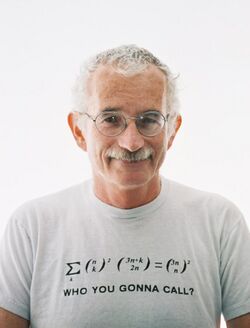Biography:Doron Zeilberger
Doron Zeilberger | |
|---|---|
 Photograph of Doron Zeilberger displaying a hypergeometric identity on his T-shirt. | |
| Born | 2 July 1950 (age 75) Haifa, Israel |
| Education | Weizmann Institute of Science |
| Known for | Alternating sign matrix conjecture Zeilberger–Bressoud theorem Wilf–Zeilberger pair |
| Awards | Lester R. Ford Award (1990) Leroy P. Steele Prize (1998) Euler Medal (2004) David P. Robbins Prize (2016) |
| Scientific career | |
| Fields | Mathematics, Computer Science |
| Institutions | Rutgers University |
| Doctoral advisor | Harry Dym |
| Doctoral students | Aaron Robertson (mathematician) |
Doron Zeilberger (דורון ציילברגר, born 2 July 1950) is an Israeli mathematician, known for his work in combinatorics.
Education and career
He received his doctorate from the Weizmann Institute of Science in 1976, under the direction of Harry Dym,[1] with the thesis "New Approaches and Results in the Theory of Discrete Analytic Functions."[2] He is a Board of Governors Professor of Mathematics at Rutgers University.[3][4]
Contributions
Zeilberger has made contributions to combinatorics, hypergeometric identities, and q-series. Zeilberger gave the first proof of the alternating sign matrix conjecture, noteworthy not only for its mathematical content, but also for the fact that Zeilberger recruited nearly a hundred volunteer checkers to "pre-referee" the paper. In 2011, together with Manuel Kauers and Christoph Koutschan, Zeilberger proved the q-TSPP conjecture, which was independently stated in 1983 by George Andrews and David P. Robbins.[5]
Zeilberger is an ultrafinitist.[6] He is also known for crediting his computer "Shalosh B. Ekhad" as a co-author[7] ("Shalosh" and "Ekhad" mean "Three" and "One" in Hebrew respectively, referring to his first computer, an AT&T 3B1[8]), and for his provocative opinions.[9]
Awards and honors
Zeilberger received a Lester R. Ford Award in 1990.[10] Together with Herbert Wilf, Zeilberger was awarded the American Mathematical Society's Leroy P. Steele Prize for Seminal Contributions to Research in 1998 for their development of WZ theory, which has revolutionized the field of hypergeometric summation. In 2004, Zeilberger was awarded the Euler Medal; the citation refers to him as "a champion of using computers and algorithms to do mathematics quickly and efficiently".[11] In 2016 he received, together with Manuel Kauers and Christoph Koutschan, the David P. Robbins Prize of the American Mathematical Society.
Zeilberger was a member of the inaugural 2013 class of fellows of the American Mathematical Society.[12]
See also
References
- ↑ Doron Zeilberger at the Mathematics Genealogy Project
- ↑ Zeilberger, Doron. "Doron Zeilberger's PhD". http://sites.math.rutgers.edu/~zeilberg/phd3.html.
- ↑ Rutgers Focus[yes|permanent dead link|dead link}}], 15 December 2000
- ↑ "Celia Zeilberger, Tim Ahmed". The New York Times. 2 September 2012. https://www.nytimes.com/2012/09/02/fashion/weddings/celia-zeilberger-tim-ahmed-weddings.html. "[Celia Le Grange Zeilberger] is a daughter of... Doron Zeilberger of Princeton, N.J. Her father is a board of governors professor of mathematics at Rutgers in New Brunswick, N.J.]"
- ↑ Koutschan, C.; Kauers, M.; Zeilberger, D. (2011). "Proof of George Andrews's and David Robbins's q-TSPP conjecture". Proceedings of the National Academy of Sciences 108 (6): 2196–2199. doi:10.1073/pnas.1019186108. Bibcode: 2011PNAS..108.2196K.
- ↑ Gefter, Amanda (August 2013). "The infinity illusion". New Scientist 219 (2930): 32–35. doi:10.1016/S0262-4079(13)62043-6.
- ↑ Wolchover, Natalie (4 March 2013). "As math grows more complex, will computers reign?". Wired. https://www.wired.com/2013/03/computers-and-math/. Retrieved 2019-02-09.
- ↑ Gallian, J. and Pearson, M., An Interview with Doron Zeilberger FOCUS 27 (2007), 14–17.
- ↑ Trivedi, Shubhendu (25 June 2012). "The opinions of Doron Zeilberger". https://onionesquereality.wordpress.com/2012/06/25/the-opinions-of-doron-zeilberger/. Examples of his opinions are:
- "The shocking state of contemporary 'mathematics', and the meta-shocking fact that very few people are shocked"
- "People who believe that applied math is bad math are bad mathematicians"
- "Guess what? Programming is even more fun than proving, and, more importantly it gives as much, if not more, insight and understanding"
- "Frank Quinn's rigor is not as rigorous as he thinks"
- "Still like that old-time blackboard talk".
- ↑ Zeilberger, Doron (1989). "Kathy O'Hara's constructive proof of the unimodality of the Gaussian polynomials". Amer. Math. Monthly 96 (7): 590–602. doi:10.2307/2325177. http://www.maa.org/programs/maa-awards/writing-awards/kathy-oharas-constructive-proof-of-the-unimodality-of-the-gaussian-polynomials.
- ↑ "Institute of Combinatorics and its Applications' 2004 Euler Medal Citation for Doron Zeilberger". http://www.math.rutgers.edu/~zeilberg/EulerMedalCitation.html.
- ↑ List of Fellows of the American Mathematical Society, retrieved 2013-09-01.
External links
- Doron Zeilberger's homepage
- Biography from ScienceWorld
- Weisstein, Eric W.. "Zeilberger's Algorithm". http://mathworld.wolfram.com/ZeilbergersAlgorithm.html.
- Weisstein, Eric W.. "Wilf-Zeilberger Pair". http://mathworld.wolfram.com/Wilf-ZeilbergerPair.html.
- Weisstein, Eric W.. "Alternating Sign Matrix Conjecture". http://mathworld.wolfram.com/AlternatingSignMatrixConjecture.html.
- Weisstein, Eric W.. "Refined Alternating Sign Matrix Conjecture". http://mathworld.wolfram.com/RefinedAlternatingSignMatrixConjecture.html.
- Weisstein, Eric W.. "Zeilberger-Bressoud Theorem". http://mathworld.wolfram.com/Zeilberger-BressoudTheorem.html.
- From A = B to Z = 60, a conference in honor of Doron Zeilberger's 60th birthday, 27 and 28 May 2010
 |

